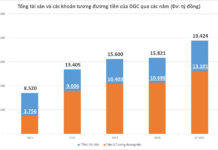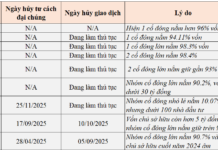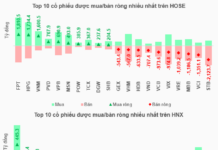On the afternoon of October 28, Deputy Minister Nguyen Duc Chi talked to the press about the bill to amend and supplement several articles of the Laws on Securities, Accounting, Independent Audit, State Budget, Management and Use of Public Assets, Tax Administration, and National Reserves (the project of 1 law amending 7 laws)
Regarding the restriction on individual investors in investing in private enterprise bonds, Article 1.2 of the Draft (amending Article 11.1a of the Securities Law), Deputy Minister Nguyen Duc Chi said that the latest version of the Draft Amended Securities Law respects the investment rights of individual investors in the market.
“The Ministry of Finance did not propose to amend the contents related to the investment rights of individual investors in the market, and they are entitled to invest in all types of private enterprise bonds.”
Mr. Nguyen Duc Chi, Deputy Minister of Finance
However, according to Mr. Chi, to improve the quality of goods in the market, limit risks, and protect the rights and interests of individual investors in the private enterprise bond market, the Draft Law proposes to improve the quality of bonds.
Accordingly, for professional investors, whether individuals or organizations, to be able to invest in private enterprise bonds, the Ministry of Finance proposes that the enterprise issuing those bonds must have a credit rating. In addition, the enterprise issuing the private enterprise bonds must have secured assets or a payment guarantee from a credit institution.

According to Mr. Chi, the Ministry of Finance also proposed to amend the decision-making process for issuing corporate bonds to the public to further facilitate qualified enterprises to quickly consider and be granted certificates for issuing bonds to the public to raise capital. For bonds issued to the public, all individual and organizational investors, regardless of professionalism, can participate.
For the market to adapt to the new policies, the Ministry of Finance plans to submit to the National Assembly for permission to have the amended Securities Law take effect from January 1, 2026.
Earlier, the Vietnam Chamber of Commerce and Industry (VCCI) also sent a document to the National Assembly to comment on the Draft Law, emphasizing that it is not possible to restrict individual investors from investing in private enterprise bonds at the moment.
VCCI said that enterprises proposed considering this regulation in two aspects.
First, the private bond market has become more stable after several measures: (1) operating a specialized HNX bond information page: where bond information is published; (2) private bonds are registered and traded centrally at HNX, ensuring transparency.
On the investor side, the criteria for professional investors have been tightened to ensure that non-professional investors do not participate in this market. Second, individual investors are aware that this is a risky market and that knowledge is necessary before participating.
Second, in the current context, the private bond market still plays an important role for enterprises, and individual investors still account for a large proportion. Public bond issuance is very small (only about 10%) due to obstacles in regulations. Organizational investors face difficulties due to investment restrictions.
“Individual investors are almost the only investors who can invest in private bonds for debt restructuring purposes. In the coming period, enterprises will need to raise capital to restructure debts that are coming due or restructure debts with high capital mobilization costs (estimated at about VND 543 trillion in the next 4 years). Therefore, enterprises will be greatly affected in capital mobilization for debt restructuring, which may affect liquidity in the next 3-5 years.”
(VCCI’s letter)
According to VCCI, the adjustment as in the Draft may cause congestion and disruption in the corporate bond market. Currently, corporate bond investors (such as commercial banks, securities companies, insurance companies, and investment funds) are facing many restrictions on bond investment regulations. Therefore, individual investors are still one of the large investors that can absorb corporate bonds. If these investors are restricted, enterprises will find it difficult to issue more bonds because there are not enough investors in the market to absorb the issued bonds.
VCCI believes that restricting individual investors will significantly affect enterprises’ capital mobilization and payment capabilities, as individual investors are almost the only investors who can invest in private bonds for debt restructuring purposes. In the coming period, enterprises will need to raise capital to restructure debts that are coming due or restructure debts with high capital mobilization costs (estimated at about VND 543 trillion in the next 4 years). Therefore, the ability to mobilize capital for debt restructuring of enterprises may be strongly affected, which may affect liquidity in the next 3-5 years.
Therefore, VCCI proposed considering not supplementing the regulation on restricting individual investors in this amendment. This regulation should only be considered after: (1) removing obstacles related to regulations on public bond offerings; (2) reducing restrictions on the investment activities of organizational investors.
Optimizing the Securities Law: Further Tailoring the Corporate Bond Market?
The corporate bond market is undergoing a transformation to restore investor confidence after a series of setbacks. With impending revisions to the Securities Law, this market is expected to face further technical tightening measures.
The New Push for Corporate Bond Market
The Vietnamese corporate bond market has been on a notable recovery path since the crisis in 2022 and the first half of 2023. While it aims to become a long-term capital mobilization channel, sharing the burden with the banking system, there are numerous aspects of the corporate bond market that need improvement. A key catalyst for the market’s future growth is considered to be credit ratings.
Unveiling the Flaws in the New Proposal for Corporate Bond Investments
The proposed criteria of a minimum of 10 transactions per quarter with professional investors in the last four quarters could potentially deter investors from participating in the bond market. This may further complicate capital raising for enterprises, as the market liquidity is already low following the collapses in 2022.









































